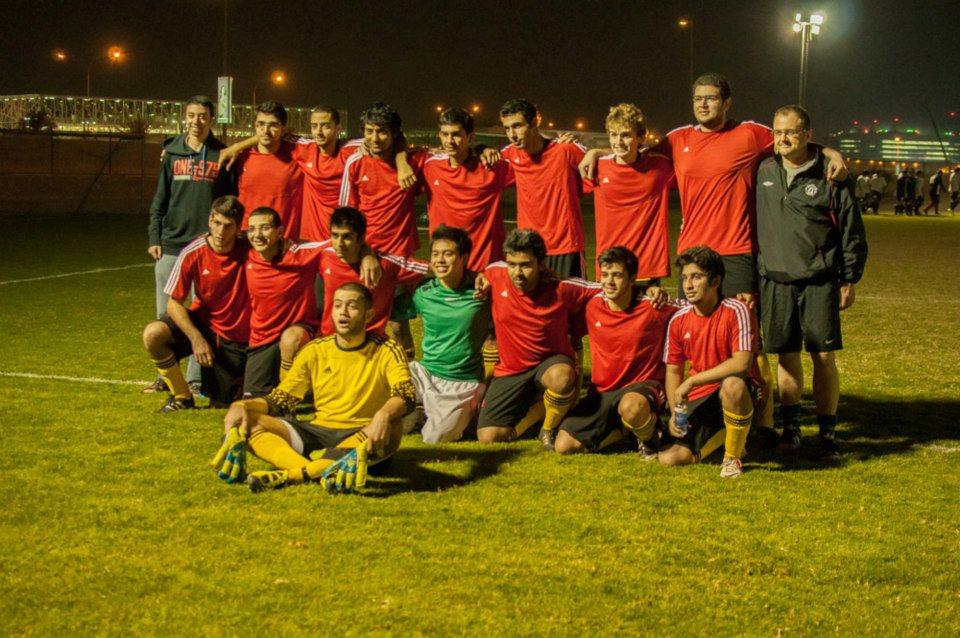By Alanna Alexander

Photo by Ralph Martins
Students at Texas A&M University at Qatar were told by university staff last weekend that they would not be able to participate on athletic teams at other universities this semester, say students.
For students at TAMUQ, who have previously been allowed to be part of the Northwestern-funded “Pirates” football team, this means that the only squad they can now be part of is the TAMUQ “Aggie” team. For students at Northwestern, this means that they won’t be able to have a team at all due to the small number of male students at NU-Q.
The email announcing the decision at TAMUQ said that the new rule was made with “direct consideration of the Aggie Core Values of Loyalty and Respect” but players are hoping that that this new decision will change, as it would greatly affect the dynamics of the Education City football league.
“In a league point of view, it’s really disappointing. There really is no more competition in the game. We’re not in the US where the students are semi-professionals and professionals. This is not the NCAA. (National Collegiate Athletic Association) We haven’t signed contracts as players. It’s very strange that something like this would even be considered,” said an A&M student and member of the Pirates team, who wanted to remain anonymous to avoid disappointments from the TAMUQ community.
TAMUQ players have played for the mixed Pirates team for more than two years now as an integral part of the team, thanks to the small male student body at Northwestern- an issue that A&M does not have to deal with.
Paul Wood, Senior User Support Specialist at NUQ, who has coached the Pirates for two years is now confronted with losing players he has trained. Of the 32 players in EC who attended the first training session he held this semester, at least two are key players on the Aggie squad.
“We have two hour practices twice or thrice every week and we play football for only 20 minutes of that,” Wood said, emphasizing that most training time is spent on the personal skills of the players. Player claim that they’ve improved both their skills as football players and have drastically improved their personal fitness as well.
For many players who have chosen to play for the Pirates over the Aggie team, its extensive training sessions are just one reason why switching to regular practices with the Aggies is so hard.
Students felt comfortable on the Pirates team as they felt it was a more close-knit community than the TAMUQ team. “We’re not from Northwestern, but we felt more like we were students there,” said another A&M student who asked not be identified in fear that his colleagues might not appreciate his closeness to the Northwestern community over the community at TAMUQ.
But it is this fear that has caused Aggie coach Jeff Sulik to reconsider letting students play for other universities- lack of unity within the student body.
“We were seeing internally a division between our students- students feeling conflicted. Should they be supporting and cheering for the Northwestern team? Should they be supporting and cheering for the A&M team? They had friends who played for both. There was a whole language around the Texas B or Texas reject team,” Sulik said. For him, the obvious solution to this issue was to completely eliminate the other team.
Many A&M players on the Pirates team have said, however, that they believe “supporting and cheering” have little to do with decision.
“The sports culture at A&M isn’t that great. And that has an affect on players. I’ve even heard A&M players complain about how their (football) games don’t receive as much attention as the basketball games,” the player added.
Sulik has said that he is willing to consider a mixed team only if it is formed under a “formal partnership”.
“If there was a formal partnership between the two universities, there would be coaches from both universities, there would be representatives from both universities who would help administer the team. I would be open to having a joint team like the Northwestern-CMU basketball team,” Sulik said.
In talks with coaches at other universities, he also mentioned an incident that was also reason for the new rule. According to Sulik, A&M players on the Pirates team were acting against the Aggie Core Values of Loyalty and Respect but did not receive the same kind of penalty that an A&M student would because they were playing for another team.
Although he is hoping that it won’t have to come to this, Wood has mentioned that he will continue to look for ways that the Pirates can continue to play together– even if that means that Northwestern will not have a team anymore.
For now, the Pirates have said that they will train and practice together as usual and hope to play in tournaments outside of EC.

Alanna Alexander • Sep 23, 2013 at 7:11 pm
@ Jeff Sulik, my question to you was phrased exactly like this:
“under what circumstances would you be willing to consider a joint team with Northwestern in the future?”
It would be my greatest pleasure to show you that recording if you would like to check your memory.
Paul Wood • Sep 22, 2013 at 2:59 pm
Thank you Alanna, for raising awareness of the situation.
I would like to submit a correction and add an update to the article.
First, the correction is that the team meet twice a week for two hours, during which we concentrate on fitness, agility and skills. They then incorporate these in a game at the end of the session.
To update your article.
I spoke to the Texas A&M Coach this today, while attending a meeting of Coaches, whose Universities have been invited to participate in the inaugural Qatar Universities Football League.
I asked him if were possible to discuss his suggestion of “a formal partnership between the two universities”?
He said he had made no such offer and that he had been misquoted. He went on to say that what he meant to say was “if Texas A&M was unable to field a football team, due to a lack of male students/players, he would consider it, but that was never going to be the case” and he added “I don’t have the time to administer two teams”.
The Pirates have been registered to take part in the Qatar Universities Football League, which kicks off on 24 October 2013.
At present we may not be able to submit a full squad of 16 players (8 players and 8 substitutes}, but will still be able to participate. The League regulations state that a team may play, so long as the team has a minimum of 7 players on the field at kickoff. The slimmed down version of the Pirates currently stands at 11 players.
Qatar Football Federation has partnered with QF Recreation Services to organise the tournament. This is especially beneficial to all of the students in HBKU, as QFF have announced that they will organise and provide the funding of certified Football Coaching and Refereeing courses for all students who are interested. This will enable players to lead coaching sessions for their teams.
This is an initiative we have already started at Northwestern, with one of the players having attended a QFF course and who has taken control of running coaching sessions for his team mates.
Look out for more news on this and the Qatar Universities Football League in the coming weeks.
Thank you
Paul
Jeff Sulik • Sep 22, 2013 at 11:38 am
I need to clarify the quote above as attributed to me.
The quote was made in the context of hypothetically if Texas A&M didn’t have enough players to field a team the university would be open to partnering with another university in order to have a joint team like in the example of CMU/NU basketball.
Texas A&M has enough players to field a team and therefore does not need to nor will be joining with another university at this time.